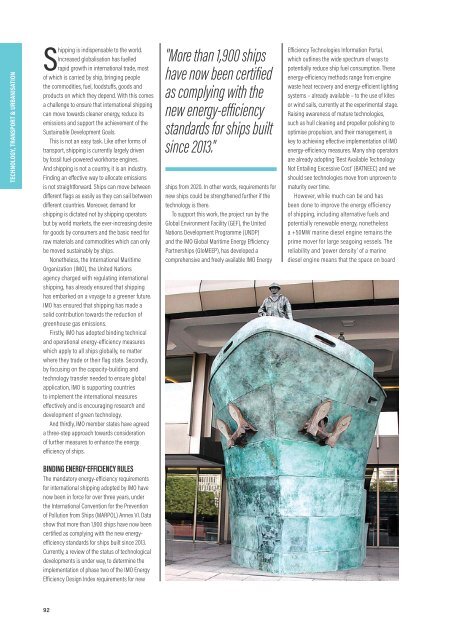Climate Action 2016-2017
Create successful ePaper yourself
Turn your PDF publications into a flip-book with our unique Google optimized e-Paper software.
TECHNOLOGY, TRANSPORT & URBANISATION<br />
Shipping is indispensable to the world.<br />
Increased globalisation has fuelled<br />
rapid growth in international trade, most<br />
of which is carried by ship, bringing people<br />
the commodities, fuel, foodstuffs, goods and<br />
products on which they depend. With this comes<br />
a challenge to ensure that international shipping<br />
can move towards cleaner energy, reduce its<br />
emissions and support the achievement of the<br />
Sustainable Development Goals.<br />
This is not an easy task. Like other forms of<br />
transport, shipping is currently largely driven<br />
by fossil fuel-powered workhorse engines.<br />
And shipping is not a country, it is an industry.<br />
Finding an effective way to allocate emissions<br />
is not straightforward. Ships can move between<br />
different flags as easily as they can sail between<br />
different countries. Moreover, demand for<br />
shipping is dictated not by shipping operators<br />
but by world markets, the ever-increasing desire<br />
for goods by consumers and the basic need for<br />
raw materials and commodities which can only<br />
be moved sustainably by ships.<br />
Nonetheless, the International Maritime<br />
Organization (IMO), the United Nations<br />
agency charged with regulating international<br />
shipping, has already ensured that shipping<br />
has embarked on a voyage to a greener future.<br />
IMO has ensured that shipping has made a<br />
solid contribution towards the reduction of<br />
greenhouse gas emissions.<br />
Firstly, IMO has adopted binding technical<br />
and operational energy-efficiency measures<br />
which apply to all ships globally, no matter<br />
where they trade or their flag state. Secondly,<br />
by focusing on the capacity-building and<br />
technology transfer needed to ensure global<br />
application, IMO is supporting countries<br />
to implement the international measures<br />
effectively and is encouraging research and<br />
development of green technology.<br />
And thirdly, IMO member states have agreed<br />
a three-step approach towards consideration<br />
of further measures to enhance the energy<br />
efficiency of ships.<br />
"More than 1,900 ships<br />
have now been certified<br />
as complying with the<br />
new energy-efficiency<br />
standards for ships built<br />
since 2013."<br />
ships from 2020. In other words, requirements for<br />
new ships could be strengthened further if the<br />
technology is there.<br />
To support this work, the project run by the<br />
Global Environment Facility (GEF), the United<br />
Nations Development Programme (UNDP)<br />
and the IMO Global Maritime Energy Efficiency<br />
Partnerships (GloMEEP), has developed a<br />
comprehensive and freely available IMO Energy<br />
Efficiency Technologies Information Portal,<br />
which outlines the wide spectrum of ways to<br />
potentially reduce ship fuel consumption. These<br />
energy-efficiency methods range from engine<br />
waste heat recovery and energy-efficient lighting<br />
systems – already available – to the use of kites<br />
or wind sails, currently at the experimental stage.<br />
Raising awareness of mature technologies,<br />
such as hull cleaning and propeller polishing to<br />
optimise propulsion, and their management, is<br />
key to achieving effective implementation of IMO<br />
energy-efficiency measures. Many ship operators<br />
are already adopting ‘Best Available Technology<br />
Not Entailing Excessive Cost’ (BATNEEC) and we<br />
should see technologies move from unproven to<br />
maturity over time.<br />
However, while much can be and has<br />
been done to improve the energy efficiency<br />
of shipping, including alternative fuels and<br />
potentially renewable energy, nonetheless<br />
a +50MW marine diesel engine remains the<br />
prime mover for large seagoing vessels. The<br />
reliability and ‘power density’ of a marine<br />
diesel engine means that the space on board<br />
BINDING ENERGY-EFFICIENCY RULES<br />
The mandatory energy-efficiency requirements<br />
for international shipping adopted by IMO have<br />
now been in force for over three years, under<br />
the International Convention for the Prevention<br />
of Pollution from Ships (MARPOL) Annex VI. Data<br />
show that more than 1,900 ships have now been<br />
certified as complying with the new energyefficiency<br />
standards for ships built since 2013.<br />
Currently, a review of the status of technological<br />
developments is under way, to determine the<br />
implementation of phase two of the IMO Energy<br />
Efficiency Design Index requirements for new<br />
92












